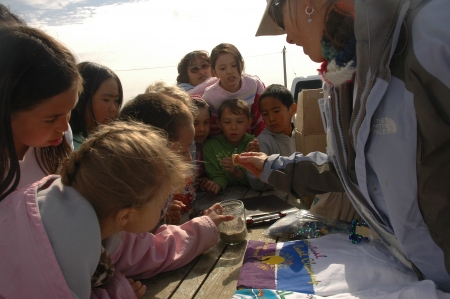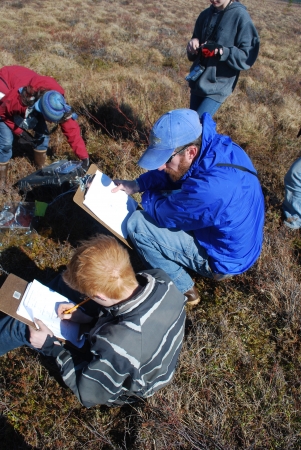About The Arctic In the Classroom Program

ARCUS is excited to bring a new program into its portfolio for 2016. The Arctic in the Classroom (TAC) program and associated workshop is partnering scientists, educators, & communities to improve Arctic education.
The Alaskan Arctic is a science-rich region with compelling natural landscapes, ecosystems, and people. Arctic science, however, is often not communicated outside the walls of research institutions and public knowledge of the Arctic is poor. At the same time, U.S. students are falling behind in Science, Technology, Engineering, and Mathematics (STEM) and teachers are struggling to develop curriculum that engages students and meets new teaching standards. This program provides a nexus between these issues, with activities targeted to educate K-12 teachers, students, communities, and others about the Arctic. In addition to increasing knowledge about the Arctic, this project brings Arctic scientists together with educators who have expertise in communicating complex concepts and facilitates effective learning through the use of real-world Arctic science.
We aim to bring together the best practices in facilitating successful citizen science projects and community-based monitoring to support the collaboration of students, teachers, and researchers in arctic communities.
What is citizen science?
Citizen science is the practice of involving non-specialists in the collection of data or recording observations that contribute to the authentic and meaningful body of science. Community based monitoring can be similar.
What is community based monitoring?
Stakeholders such as the public, professional observers, and community members may assist in the collection of data and observations, the monitoring projects themselves are driven by needs and values of the communities to which the monitoring or research is relevant.
ARCUS will identify tools within the best practices of how to administer these science practices, with the goal of developing a framework for new and experienced researchers to engage arctic communities in their work, and offer a window for students and teachers into the relevancy of science projects in their communities.
Program Goals and Objectives

Actively engage Arctic K-12 students, teachers, and community members with local research projects through a citizen science framework.
- Increase participating student and community members awareness of the Arctic, its changing environment, and Arctic research through active engagement in research projects.
- Increase participating teachers’ awareness of the Arctic, the changing environment, and Arctic research through active engagement in research projects.
- Increase participating researchers’ understanding of citizen science and the relevancy within the larger body of science practice and knowledge.
- Increase particpating researchers’ interest and willingness to engage in citizen science and communities where their research takes place.
Manage the teams’ collaborative work resulting in K-12 Arctic-focused educational resources; based on citizen science contribution in research.
- Improve the use of quality-assured data sets, collected through citizen science, by teachers, students, and researchers.
- Support the development of online K-12 educational resource(s) that utilize these data sets.
Manage dissemination of Arctic-focused educational resources and make these available to teachers in Alaska and nationwide.
- Increase the number of teachers and researchers that utilize Arctic-focused education resources.
Develop ARCUS role in researchers meeting outreach goals, including citizen science projects as proof of concept.
- Improve ARCUS-branded, institutionalized practices learned through project.
- Develop and disseminate products that reflect lessons learned.
- Increase researcher, agency, and institution awareness of ARCUS capacities.
Activities
2016 Collaboration Workshop: Make an Impact
The goal of this workshop was to bring together local teachers with Arctic researchers to raise awareness of citizen science and community-based monitoring in Arctic communities. The 2016 workshop kicked off collaborative development of STEM educational resources related to Arctic research priorities.
When: March 13-15, 2016
Where: University of Alaska, Fairbanks, Alaska
Find more information at The Arctic in the Classroom Workshop page.
Teams in the Field
The Make an Impact workshop identified interested teachers, researchers, and community members to form local teams. These teams will do site visitation and presentations to the community on their work. Data collection through citizen science teams began in Fall 2016 and continues through sustained TAC support.
Sustained Training and Support
To foster the development of high-quality resources and products, and to build sustainable collaborations between Arctic researchers, teachers, and communities, continued training and support will be provided. The support includes:
- Training teachers about Arctic science.
- Training scientists how to communicate Arctic science.
- Connecting with Arctic communities.
Resources and Products
ARCUS is using adaptive management practices to facilitate the development of resources and products that are most meaningful to the teams that are formed. The project allows participants the flexibility to design and develop their educational resources to best fit their expertise and need. Please visit project team pages to view resources created by each team.
The Arctic in the Classroom project has produced the following products:
1. ARCUS hosted the Make an Impact Workshop at ASSW 2016. This was the kick-off event for The Arctic in the classroom project. A detailed workshop report can be found at Make an Impact Workshop Information.
2. The June 2016 Witness the Arctic included a short article about TAC.
3. Writer-in-Residence, Erica Watson, wrote an essay about the Make an Impact Workshop in March 2016. The essay can be viewed online at The Arctic Institute.
4. The working group meeting on Culturally Responsive Outreach to Indigenous Alaska K-12 Students by Marine Scientists, May 21-22, 2019, convened in Anchorage, Alaska. This working group meeting was supported by funding from the North Pacific Research Board. The purpose of the meeting is to review and adapt existing guidance about culturally responsive instructional strategies and/or to develop new guidance and resources.
Support for this program is provided by the Arctic Research Consortium of the U.S. (ARCUS) and applicable community service payments from federal court settlements.
